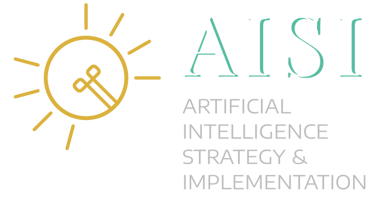Why you should upgrade your travel business with AI travel technology
A guide for travel business owners on embracing AI in 5 graphs. This article provides data-backed insights and five data visualization ideas to help you implement AI travel technology and future-proof your business.
AI IN HOSPITALITY AND TRAVEL
Garret Farmer-Brent
9/4/2025


The integration of AI is no longer a future trend but a present-day reality for the travel and hospitality industry. This guide breaks down the key reasons why you should upgrade your business with AI in travel and provides data-backed insights to help you get started.
In This Article:
Customer Experience & Personalization: How AI creates unique and engaging experiences that drive customer loyalty.
Operational Efficiency & Revenue: The financial benefits of AI for streamlining processes and maximizing profitability.
Customer Service & Self-Service: Why travelers prefer automated support and how AI delivers it.
Marketing & Advertising: Using AI for smarter ad campaigns, better targeting, and more effective content.
Sustainability & Overtourism: How AI is helping the industry address its biggest social and environmental challenges.
Customer Experience & AI Personalization
Today's travelers expect more than a simple booking; they want a personalized journey that feels tailored to them. AI makes this possible by analyzing vast amounts of data to understand individual preferences and create unique experiences. This level of personalization not only enhances customer satisfaction but also builds a foundation for long-term loyalty.
74% of hotel executives believe that AI is a key tool for tailoring services to their guests (Oracle/Skift).
For consumers, personalized itineraries are the top reason for using AI travel planning tools (Kantar).
AI-powered recommendation engines can boost bookings by 10% to 25% by suggesting tailored trips (Mize).
Behavior-based personalization drives a 142.8% higher conversion rate compared to simple attribute-based personalization (EMARKETER).
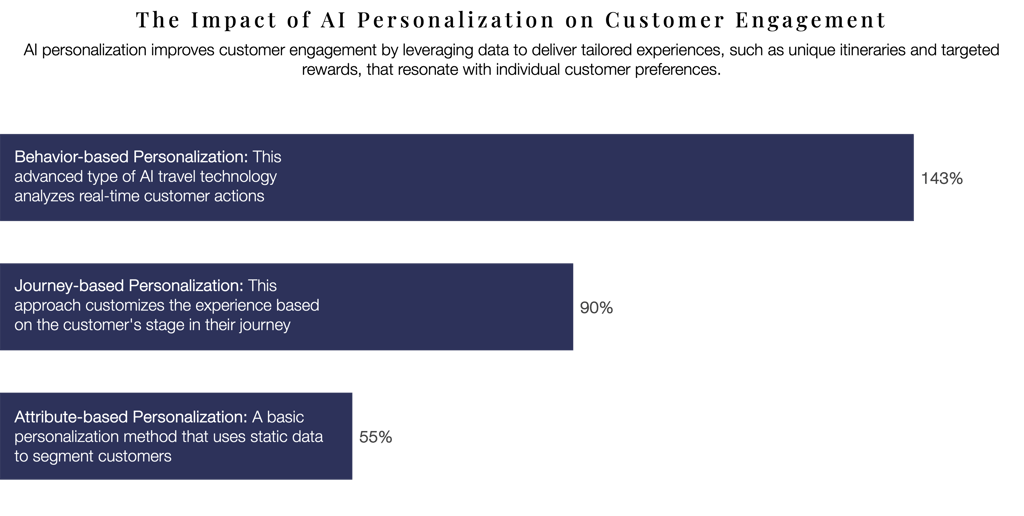

1. Behavior-based AI Personalization
This is the most advanced type of personalization, where AI travel technology analyzes a customer's real-time actions and historical behavior to deliver highly relevant content. This goes beyond simple demographics to understand what a customer is doing and what they might do next.
For example, if a customer repeatedly searches for "luxury beach resorts in Thailand," AI uses this behavior to instantly show them a curated list of relevant options and personalized deals. According to an EMARKETER report, this method drives a 142.8% higher conversion rate, showing its effectiveness in engaging users.
2. Journey-based Personalization
This method focuses on where a customer is in their decision-making process. The AI system tailors the experience based on whether the customer is in the "inspiration" phase (e.g., browsing destinations on social media), the "planning" phase (e.g., searching for flights and hotels), or the "post-booking" phase (e.g., looking for local activities).
For example, after a customer books a flight to Rome, AI can automatically send them a curated list of experiences in that city, such as a guided tour or a cooking class. This approach drives an 89.6% conversion rate.
3. Attribute-based Personalization
This is the most basic form of personalization. It relies on static data points or attributes to create customer segments. These attributes can include age, gender, location, or past purchase history.
For example, a travel company might create a segment for "families with young children" and use AI to automatically show them holiday packages with kid-friendly activities or hotel rooms with family suites. While still effective, this method is less dynamic and results in a lower conversion rate of 55.1%.
Operational Efficiency & Revenue with Artifial Intelligence
For many businesses, the biggest value of AI travel software lies in its ability to optimize internal processes. AI can automate repetitive tasks, manage complex data, and provide predictive insights that directly impact your bottom line. This efficiency frees up staff to focus on high-value tasks, like direct customer engagement, while increasing profitability.
AI-enhanced revenue management systems can increase a hotel's RevPAR (Revenue per Available Room) by 10% to 15% (SuperAGI).
AI-based dynamic pricing can increase flight occupancy by 2.7% compared to traditional pricing (Mize).
The hotel industry stands to save approximately $800 million annually on maintenance costs by adopting AI travel technology (Global News Wire).
An AI-powered tool used by MSC Cruises can optimize itineraries and reduce emissions by 10% to 15% (Mintel).
Why do AI-enhanced systems increase revenue?
AI in revenue management works by analyzing vast amounts of data in real-time, including market demand, competitor pricing, and historical booking patterns. This allows it to dynamically adjust prices to maximize profitability. Instead of setting a fixed price, the AI system can raise prices during periods of high demand and lower them to attract bookings during slower periods.
AI can help travel businesses identify and eliminate unprofitable guest discounts and segments, allowing them to allocate resources more effectively. A key finding from a paper published by Emerald highlights that AI has the potential to increase operational efficiency and enhance customer experiences. By streamlining tasks like scheduling and inventory management, AI frees up staff to focus on higher-value activities. This improved efficiency also contributes directly to the bottom line by reducing costs and increasing overall productivity.
Is your travel business ready for the next upgrade to your technology mix – but you don't know where to start?
AI Customer Service & Self-Service
Travelers today are more digitally savvy and often prefer the speed and convenience of self-service options. AI travel software provides a powerful solution by offering 24/7 support without the need for human intervention on every query. This "high-tech, low-touch" approach is a significant draw for a wide range of consumers.
AI chatbots are capable of handling approximately 80% of all customer service interactions (Mize).
73% of travelers are more likely to book with hotels that offer self-service technology to minimize contact with staff (Oracle/Skift).
77% of travelers are interested in using automated messaging or chatbots for customer service requests (Oracle/Skift).
On a global scale, 86% of consumers want clarity on whether they are interacting with an AI chatbot or a human (Mintel).
Travelers today increasingly favor self-service technology in their paid accommodation. This preference stems from a desire for efficiency and a low-contact experience, a trend accelerated by the pandemic.
Many guests appreciate the convenience of using their own devices for tasks like check-in and check-out, and they value the speed of automated messaging over waiting to speak with staff.
While self-service is a significant draw, travelers still value the option of human interaction for more complex needs.
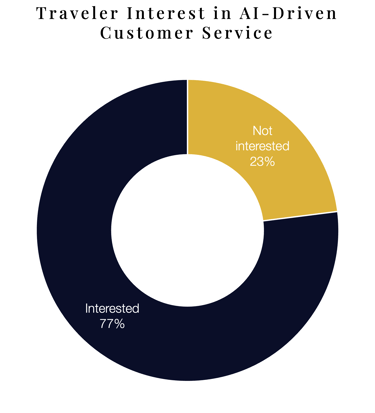

AI Marketing & Advertising
AI has moved beyond simple campaign management and is now a critical component of modern marketing strategy. It enables businesses to reach the right audience with the right message at the right time, maximizing impact and return on investment. From ad spend optimization to content creation, AI in travel is providing a competitive edge.
Travel industry digital ad spending is expected to grow, but remains a small share of the overall market at just 2.5% in 2025 (EMARKETER).
Travel has the second-highest social ad cost-per-click on Meta, highlighting the intense competition for traveler attention (EMARKETER).
89% of travel leaders believe that AI is an essential tool for modern customer relationship management (Mintel).
AI-driven ad campaigns are capable of predicting which audiences are most likely to convert (Mize).
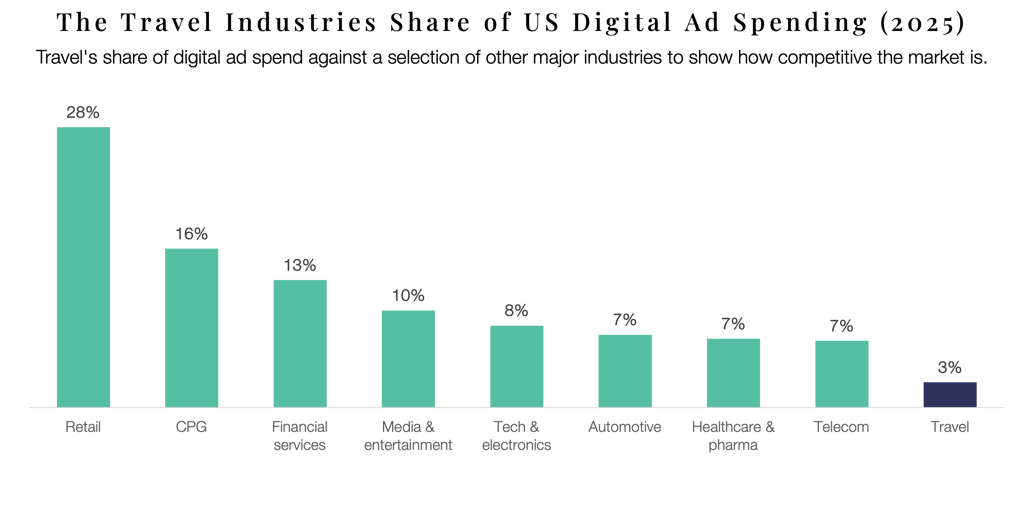

The travel industry's low share of digital ad spending can be attributed to several factors. A key reason is the significant impact of external economic events, such as the pandemic and ongoing macroeconomic pressures, which have caused companies to cut back on discretionary ad budgets.
A report from EMARKETER notes that travel's digital ad spending growth is in the bottom half of all industries for 2025, signaling a cooling-off period after a rebound. This is further compounded by intense competition within the digital advertising space, as travel battles with larger sectors like retail and financial services for consumer attention.
Sustainability & Overtourism
As environmental concerns and the issue of overtourism become more prominent, AI is offering innovative solutions. By analyzing travel patterns and consumer preferences, AI can help businesses and destinations promote more responsible tourism practices.
71% of holidaymakers are interested in seeing sustainability information before they book a trip (Mintel).
70% of travelers would be willing to pay more for a sustainable accommodation option (Mintel).
86% of travelers want travel companies to recommend quieter destinations to combat overtourism (Mintel).
Overtourism protests have put off 41% of UK holidaymakers from visiting certain destinations (Mintel).
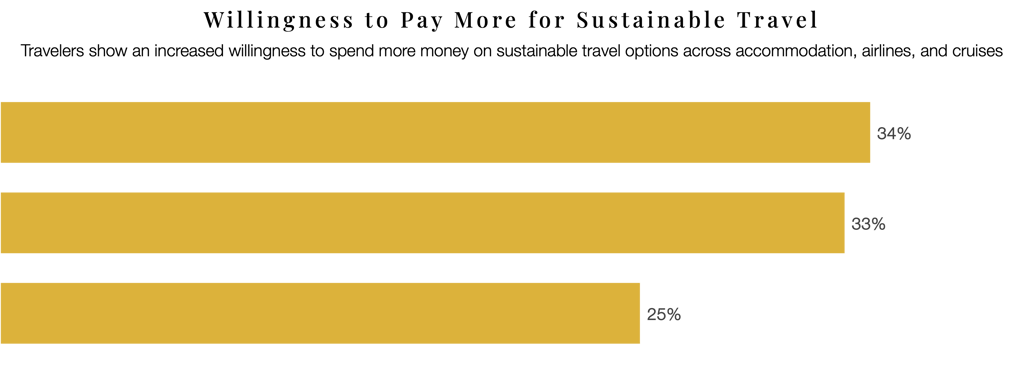

Upgrading your travel business with AI is a strategic move that addresses both market demands and operational needs. By starting with a clear focus on a single area, such as a customer-facing chatbot or a revenue management system, you can test the waters, demonstrate value, and build a roadmap for a fully integrated AI in travel future. The data shows that the benefits are clear, and the time to start is now.
The case for enhancing your travel business with AI is clear
Begin your AI business upgrade today by taking our comprehensive AI Readiness Assessment.
You'll receive a full business analysis report at no charge.
